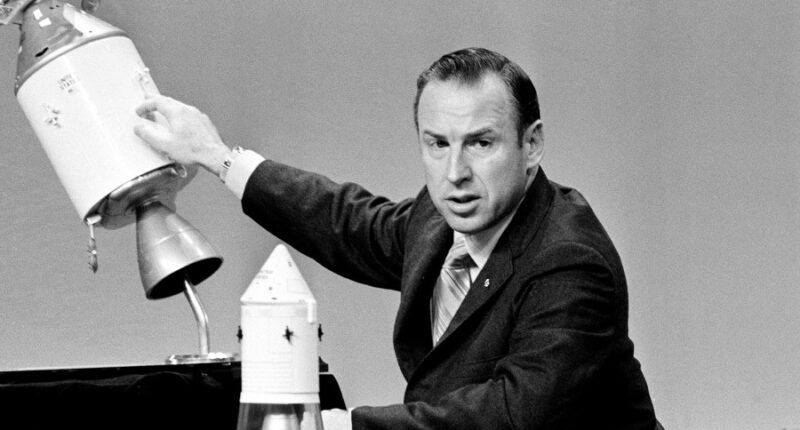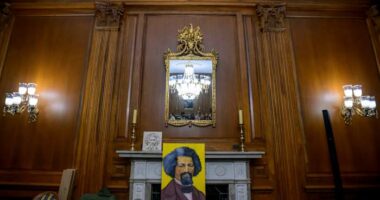Share this @internewscast.com

CHICAGO (AP) — James Lovell, known for commanding the Apollo 13 mission that transformed a near-disaster into a remarkable example of ingenuity and resilience, has passed away at the age of 97.
Lovell died Thursday in Lake Forest, Illinois, NASA said in a statement on Friday.
“Jim’s integrity and unwavering bravery helped our nation achieve the Moon mission and convert a possible catastrophe into a triumph from which we gained tremendous insights,” NASA stated. “We grieve his loss while honoring his contributions.”
As one of NASA’s most experienced astronauts during its early years, Lovell completed four missions — Gemini 7, Gemini 12, Apollo 8, and Apollo 13 — with the two Apollo missions capturing the world’s attention.
In 1968, the Apollo 8 team comprised of Lovell, Frank Borman, and William Anders became the first to exit Earth’s orbit and fly to, as well as circle, the moon. Although they couldn’t land, their journey boosted the U.S. ahead in the space race with the Soviets. The crew received letters praising their remarkable photo of Earth, a pale blue dot from the moon, and their Christmas Eve reading from Genesis, crediting them with helping to comfort America during 1968’s turbulence.
The Apollo 13 mission had a lifelong impact on Lovell
However, the real-life drama unfolded later with Apollo 13’s perilous 1970 mission. Lovell was intended to be the fifth person on the moon, but a sudden explosion in the service module’s oxygen tank forced him and two fellow astronauts into a tense fight for survival, spending four frigid and humid days in the small lunar module lifeboat.
“What I hope most people will remember is that in many ways, it was quite a success,” Lovell reflected in a 1994 interview. “Not because we achieved anything new, but because we showcased the resourcefulness of NASA’s team.”
A retired Navy captain known for his calm demeanor, Lovell told a NASA historian that his brush with death did affect him.
“I don’t worry about crises any longer,” he said in 1999. Whenever he has a problem, “I say, ‘I could have been gone back in 1970. I’m still here. I’m still breathing.’ So, I don’t worry about crises.”
And the mission’s retelling in the popular 1995 movie “Apollo 13” brought Lovell, Fred Haise and Jack Swigert renewed fame — thanks in part to Lovell’s movie persona reporting “Houston, we have a problem,” a phrase he didn’t exactly utter.
Lovell had ice water in his veins like other astronauts, but he didn’t display the swagger some had, just quiet confidence, said Smithsonian Institution historian Roger Launius. He called Lovell “a very personable, very down-to-earth type of person, who says ‘This is what I do. Yes, there’s risk involved. I measure risk.’”
Lovell spent a total of nearly 30 days in space
In all, Lovell flew four space missions — and until the Skylab flights of the mid-1970s, he held the world record for the longest time in space with 715 hours, 4 minutes and 57 seconds.
Aboard Apollo 8, Lovell described the oceans and land masses of Earth. “What I keep imagining, is if I am some lonely traveler from another planet, what I would think about the Earth at this altitude, whether I think it would be inhabited or not,” he remarked.
That mission may be as important as the historic Apollo 11 moon landing, a flight made possible by Apollo 8, Launius said.
“I think in the history of space flight, I would say that Jim was one of the pillars of the early space flight program,” Gene Kranz, NASA’s legendary flight director, once said.
Lovell was immortalized by Tom Hanks’ portrayal
But if historians consider Apollo 8 and Apollo 11 the most significant of the Apollo missions, it was during Lovell’s last mission — immortalized by the popular film starring Tom Hanks as Lovell — that he came to embody for the public the image of the cool, decisive astronaut.
The Apollo 13 crew of Lovell, Haise and Swigert was on the way to the moon in April 1970, when an oxygen tank from the spaceship exploded 200,000 miles from Earth.
That, Lovell recalled, was “the most frightening moment in this whole thing.” Then oxygen began escaping and “we didn’t have solutions to get home.”
“We knew we were in deep, deep trouble,” he told NASA’s historian.
Four-fifths of the way to the moon, NASA scrapped the mission. Suddenly, their only goal was to survive.
Lovell’s “Houston, we’ve had a problem,” a variation of a comment Swigert had radioed moments before, became famous. In Hanks’ version, it became “Houston, we have a problem.”
What unfolded over the next four days captured the imagination of the nation and the world, which until then had largely been indifferent about what seemed a routine mission.
With Lovell commanding the spacecraft, Kranz led hundreds of flight controllers and engineers in a furious rescue plan.
The plan involved the astronauts moving from the service module, which was hemorrhaging oxygen, into the cramped, dark and frigid lunar lander while they rationed their dwindling oxygen, water and electricity. Using the lunar module as a lifeboat, they swung around the moon, aimed for Earth and raced home.
By coolly solving the problems under the most intense pressure imaginable, the astronauts and the crew on the ground became heroes. In the process of turning what seemed routine into a life-and-death struggle, the entire flight team had created one of NASA’s finest moments that ranks with Neil Armstrong’s and Buzz Aldrin’s walks on the moon nine months earlier.
“They demonstrated to the world they could handle truly horrific problems and bring them back alive,” said Launius.
The loss of the opportunity to walk on the moon “is my one regret,” Lovell said in a 1995 interview with The Associated Press for a story on the 25th anniversary of the mission.
President Bill Clinton agreed when he awarded Lovell the Congressional Space Medal of Honor in 1995. “While you may have lost the moon … you gained something that is far more important perhaps: the abiding respect and gratitude of the American people,” he said.
Lovell once said that while he was disappointed he never walked on the moon, “The mission itself and the fact that we triumphed over certain catastrophe does give me a deep sense of satisfaction.”
And Lovell clearly understood why this failed mission afforded him far more fame than had Apollo 13 accomplished its goal.
“Going to the moon, if everything works right, it’s like following a cookbook. It’s not that big a deal,” he told the AP in 2004. “If something goes wrong, that’s what separates the men from the boys.”
James A. Lovell was born March 25, 1928, in Cleveland. He attended the University of Wisconsin before transferring to the U.S. Naval Academy, in Annapolis, Maryland. On the day he graduated in 1952, he and his wife, Marilyn, were married.
A test pilot at the Navy Test Center in Patuxent River, Maryland, Lovell was selected as an astronaut by NASA in 1962.
Lovell retired from the Navy and from the space program in 1973, and went into private business. In 1994, he and Jeff Kluger wrote “Lost Moon,” the story of the Apollo 13 mission and the basis for the film “Apollo 13.” In one of the final scenes, Lovell appeared as a Navy captain, the rank he actually had.
He and his family ran a now-closed restaurant in suburban Chicago, Lovell’s of Lake Forest.
His wife, Marilynn, died in 2023. Survivors include four children.
AP Science Writer Seth Borenstein contributed to this report.








